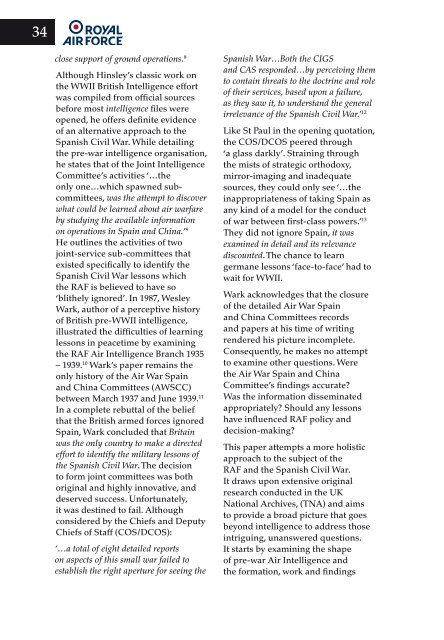Create successful ePaper yourself
Turn your PDF publications into a flip-book with our unique Google optimized e-Paper software.
34<br />
close support of ground operations. 8<br />
Although Hinsley’s classic work on<br />
the WWII British Intelligence effort<br />
was compiled from official sources<br />
before most intelligence files were<br />
opened, he offers definite evidence<br />
of an alternative approach to the<br />
Spanish Civil War. While detailing<br />
the pre-war intelligence organisation,<br />
he states that of the Joint Intelligence<br />
Committee’s activities ‘…the<br />
only one…which spawned subcommittees,<br />
was the attempt to discover<br />
what could be learned about air warfare<br />
by studying the available information<br />
on operations in Spain and China.’ 9<br />
He outlines the activities of two<br />
joint-service sub-committees that<br />
existed specifically to identify the<br />
Spanish Civil War lessons which<br />
the RAF is believed to have so<br />
‘blithely ignored’. In 1987, Wesley<br />
Wark, author of a perceptive history<br />
of British pre-WWII intelligence,<br />
illustrated the difficulties of learning<br />
lessons in peacetime by examining<br />
the RAF <strong>Air</strong> Intelligence Branch 1935<br />
– 1939. 10 Wark’s paper remains the<br />
only history of the <strong>Air</strong> War Spain<br />
and China Committees (AWSCC)<br />
between March 1937 and June 1939. 11<br />
In a complete rebuttal of the belief<br />
that the British armed forces ignored<br />
Spain, Wark concluded that Britain<br />
was the only country to make a directed<br />
effort to identify the military lessons of<br />
the Spanish Civil War. The decision<br />
to form joint committees was both<br />
original and highly innovative, and<br />
deserved success. Unfortunately,<br />
it was destined to fail. Although<br />
considered by the Chiefs and Deputy<br />
Chiefs of Staff (COS/DCOS):<br />
‘…a total of eight detailed reports<br />
on aspects of this small war failed to<br />
establish the right aperture for seeing the<br />
Spanish War…Both the CIGS<br />
and CAS responded…by perceiving them<br />
to contain threats to the doctrine and role<br />
of their services, based upon a failure,<br />
as they saw it, to understand the general<br />
irrelevance of the Spanish Civil War.’ 12<br />
Like St Paul in the opening quotation,<br />
the COS/DCOS peered through<br />
‘a glass darkly’. Straining through<br />
the mists of strategic orthodoxy,<br />
mirror-imaging and inadequate<br />
sources, they could only see ‘…the<br />
inappropriateness of taking Spain as<br />
any kind of a model for the conduct<br />
of war between first-class powers.’ 13<br />
They did not ignore Spain, it was<br />
examined in detail and its relevance<br />
discounted. The chance to learn<br />
germane lessons ‘face-to-face’ had to<br />
wait for WWII.<br />
Wark acknowledges that the closure<br />
of the detailed <strong>Air</strong> War Spain<br />
and China Committees records<br />
and papers at his time of writing<br />
rendered his picture incomplete.<br />
Consequently, he makes no attempt<br />
to examine other questions. Were<br />
the <strong>Air</strong> War Spain and China<br />
Committee’s findings accurate?<br />
Was the information disseminated<br />
appropriately? Should any lessons<br />
have influenced RAF policy and<br />
decision-making?<br />
This paper attempts a more holistic<br />
approach to the subject of the<br />
RAF and the Spanish Civil War.<br />
It draws upon extensive original<br />
research conducted in the UK<br />
National Archives, (TNA) and aims<br />
to provide a broad picture that goes<br />
beyond intelligence to address those<br />
intriguing, unanswered questions.<br />
It starts by examining the shape<br />
of pre-war <strong>Air</strong> Intelligence and<br />
the formation, work and findings

















